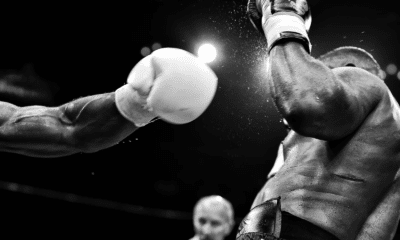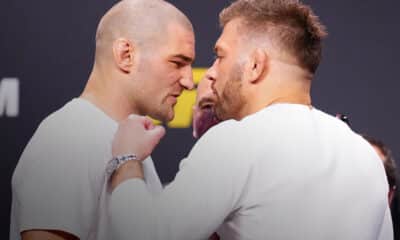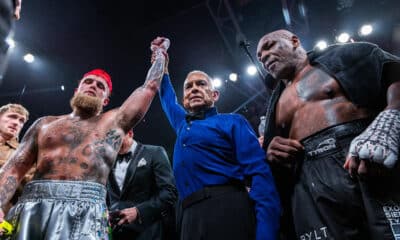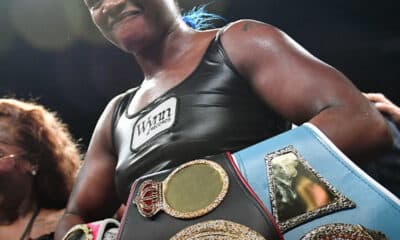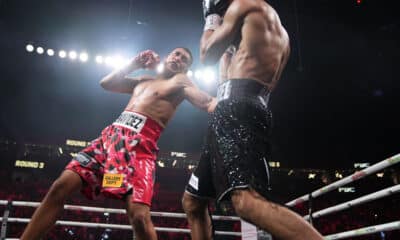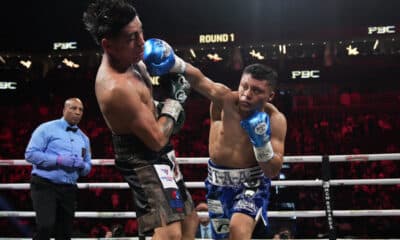I was hospitalized with congestive heart failure this past fall and suffered a stroke two days after Christmas. Life can change quickly.
Thinking of myself as a healthy human being, at least a 65-year old one, this was a complete shock. Five mile walks a few times a week, workouts with a kettlebell or shadowboxing another three.
Half the meals my wife and I made were vegetarian, and when we ate meat it was mostly fish, sometimes chicken. I do have a sweet tooth, though, and always enjoyed dessert after dinner.
Before coming down with COVID, in November of 2022, my waking pulse was 45, give or take a beat. I was laid out for five weeks by the virus, and when it was through with me my pulse was ten beats higher. I wondered what this meant for my long-term health. Now I know.
It was several months after COVID passed before I could train as I once had.
Beginning with ten minute walks that gradually stretched to an hour. It felt good to be moving again. I was never as comfortable in the gym, however, even when I could eventually complete the same drills. Breathing was more difficult and the work became more of a struggle.
I looked less forward to exercise, which was once one of the best parts of my day. But I kept at it, thinking that at my age it would take a while to get back into condition.
Eight or nine months after COVID, I began faltering. I would cut workouts short, or at times skip a day altogether. My wife warned me after one walk that I did not look well. I usually came home refreshed; this day she said I looked worn.
Realizing I needed to see my doctor, I planned to call him the next day. But Mother Nature had another idea. Unable to sleep that night, I rose early in the morning to lie on the living room recliner, hoping that elevating my head would ease my breathing.
I couldn’t sleep in the chair, either, so got up to make coffee, which was a mistake. I knew from the first sip.
It felt as though my head was spinning a hundred miles an hour, with the world closing in on me, and all the lights turning off. I woke my wife, telling her I needed to go to the hospital. She called her daughter, who lives a few blocks away, and within 30 minutes of entering the ER, I was admitted.
When the doctor said I had congestive heart failure, I pictured an old man and an oxygen tank, thinking my life was over.
Guaranteed by medical personnel, however, that because I was relatively young and otherwise healthy and could still have a good, normal life, I remained optimistic for a couple months.
The understanding now, though, is that the truth, for which I am still searching, lies somewhere in the middle of those two extremes, between death and normal.
Medication and keeping an eye on my sodium levels allowed me to soon be walking 30 and even 40 minutes again, for which I was thankful, even though I moved much more slowly than before. The doctors let me know I would not be able to exercise as I once had, but could still be active. The question was how active.
My favorite hobby is (more likely was) skin diving. What today is referred to as free diving – using only a mask, snorkel, and fins. I have called it skin diving for 60 years, though, and don’t feel the need to change. Diving is not something I was great at, and a minute at around 30 feet constitutes (constituted) my limit. But I loved it.
Diving, especially diving for abalone, when it was legal, is the only activity I have engaged in as an adult that is so consuming I think of nothing else but the diving. Beyond being physically demanding it was wonderful for my mental health, too. Since childhood, I have wanted to swim underwater as freely as a dolphin, and diving with long fins is as close as I have come.
The Northern California ocean is not warm. Being in it for any amount of time requires a substantial wetsuit and an equally substantial weight belt to overcome the buoyancy of the wetsuit.
Climbing cliffs on the rocky coast, kicking down to your desired depth and then kicking back up, loading and unloading a speargun, and sometimes paddling in a kayak to a preferred diving location – divers, just like fishermen, have favorite spots – makes for an exhausting day, especially when one is no longer young. The working out is what allowed me to do this.
On my 30 and 40 minute walks I began to dream of diving again. The doctors and medical scientists are pretty much in consensus about diving being contraindicated for those with heart failure, but I know what I wanted.
But a few days before Christmas my blood pressure began rising. A blood pressure cuff and a scale are two of a heart failure patient’s best friends. I now need to monitor my blood pressure daily and check that I am not quickly gaining weight, which is a sign of fluid retention due to the heart failure.
I rose December 27, unable to sleep, and on that morning, too, the first sip of coffee set me off. This time my head was spinning as before but also felt as though it was exploding. I managed to put the blood pressure cuff around my arm, and a reading of 213/135 told me I once again needed to be in a hospital. Barely able to stand, I bounced from wall to wall looking for my wife, waking her other daughter, who always visits at Christmas, in the process. She was here more permanently this time, wanting to be closer to her mother as she ages and has her own health problems.
The hospital is about five miles from our home, but once in my truck we realized I could not make it that far. A detour to the local firehouse found an ambulance.
The stroke was a much more frightening experience than the heart failure.
Some of that fear could have been because it followed so closely behind the initial hospitalization. I was very, very fortunate that the few obvious symptoms of the stroke – slurred speech, lessened balance, and difficulty holding onto objects – began to wane within hours. They were unnoticeable in a few days, except for when I was tired and my speech slowed to a crawl, dragging a few words behind it.
I lacked the energy to do much of anything, though, other than lie around.
Learning more about fats and salts and sugars than I ever wanted to know, we are developing a new diet that is “heart healthy” while also trying not to put too many taste buds out of work.
I am thankful to be breathing, but the life I once loved is now dead and gone, and I miss it. No one in the hospital this second time spoke about the quality of a long-lived life. The focus was on avoiding another stroke.
The stroke might have been scarier, but it is the heart failure that will most affect the remainder my time.
I am prevented from exercising as aggressively as I would like – to be honest, from exercising to any degree – in rehabilitation of the stroke because with heart failure the lungs fill with fluid whenever I try to perform more work than my heart can bear.
I can no longer walk even as I did after the initial heart failure, because my heart was further weakened by the stroke.
Before this, I thought of my cardiovascular system as an engine, maybe not the fastest or strongest in town, but one that could carry a good load at a good pace for most of the day.
Now, however, the image I have of myself is of a car with a blown motor, something able to make it to the neighborhood grocery store for a carton of (soy) milk and a loaf of bread, but no longer healthy enough for longer trips, certainly not a highway.
I experienced episodes of light-headedness, the first few days out of hospital, and sensations of spinning so similar to the beginnings of another stroke, I was sure my end was near.
I kept thinking of the television show “Sanford & Son,” with Fred Sanford calling out, “I’m coming Elizabeth.” Constantly looking over my shoulder, I was fearful the reaper was close behind. When he makes two house calls in such quick succession as he did with me, you know his interest is more than casual.
The blood pressure was difficult to control, and I did not know what was going to happen. My wife, who has seen her share of death, had doubts I would live.
I take more pills in a week now than I had in the whole of my life previous to this, but at least my blood pressure is currently somewhat stabilized.
For the first time in my life I’ve had to contemplate the possibility of death in more than the abstract. Making sure that everything is administratively in place, with my affairs in order, is the easy part.
The emotions are more difficult.
I don’t like to think I took life for granted before this, but you can’t really know how much you appreciate this world until you see, right in front of you, someone here to usher you out of it.
Always thankful for every day I wake, I know that life is a gift, and not mine alone. I didn’t know how much the gift meant to me until I was lying in the ambulance thinking of passing, overwhelmed, I am sure, with heart failure and then a stroke coming so quickly for me. I wasn’t ready to leave. The paramedic saw tears in my eyes and asked what was wrong.
“I think I’m dying,” I said.
“Not today,” she assured me. “We don’t even have the siren on.”
My mind has been busy with more than emotions and administration, reflecting on the meaning of this experience, maybe even the benefits. The sadness of loss is a powerful, if painful, way of more fully knowing yourself. It might well be that grief is essential for any deep contemplation.
Most of my convalescence has involved reading, once I had the energy to hold and concentrate on a book.
One of the books I have spent time with is Wendell Berry’s collection of essays, What are People For, which begins with two poems, “Damage” and “Healing,” that serve as the book’s prologue. And this is how I read them, as a single unit. Although the poetic expression might have been presented as two separate compositions, they speak to me in unison.
Those familiar with Berry’s writing will not be surprised with the themes of either the poems or the essays. Berry’s call for humility works as a form of prophecy, and here he is again warning us of the “way of ignorance.”
Counseling us that even though we have the freedom and the capability to carry forward in certain ways, it might not always be prudent to act on some of our desires.
Berry describes an act of hubris on his part, the digging of a pond on a hillside on his property. The removal of all the dirt weakened the structural strength of the hill’s slope, and it collapsed in a landslide.
He had procured professional advice before digging, but understood with hindsight that
No expert knows everything about every place, not even everything about any place.
We humans often act on incomplete information, sometimes necessarily so, sometimes out of arrogance. But, always, it is our responsibility to accept the consequences of these actions.
The trouble was the familiar one: too much power, too little knowledge. The fault was mine.
Understanding also, in humanity’s aspiration for the infinite that
Desire will always outreach the possible
But hopefully, in our overreach we can come to know and achieve what is possible.
But to fulfill the possible is to enlarge it.
Knowing that to amplify the possible often, possibly always, involves transgression.
“And yet there is damage – to my place and to me.”
Berry also sees that,
In the course of time and nature it will heal.
For those with a conscience, a group in which we can certainly include Berry, one’s acts of misplaced pride will be troubling, for they affect the sinner, ultimately, as much as those offended by the sin.
Until that wound in the hillside, my place is healed, there will be something impaired in my mind.
A troubled conscience is what leads us to reflection. A troubled conscience might well be the primary purpose of a conscience.
Berry then takes a turn that brings his verse home to me.
It used to be that I could think of art as a refuge from such troubles.
One could read a good poem – or better, write one.
I, too, am a writer. Not a novelist in any formal sense, for I can only tell stories from my personal experience. I want to write truthfully, and my sense of the truth is so constraining it is almost religious. I can’t make things up, but can see, as Norman Maclean said of himself, the moments when life becomes a poem.
Having spent all my adult life trying to understand and come to terms with choices I made when entering my last year of high school, decisions that would affect the remainder of my life, my troubles led me to literature when in my thirties.
So thankful for the discovery, I at first treated the world of belles lettres like a new romantic partner, thinking it might save me from myself.
But, as with all relationships in which we persevere, as the brightness of infatuation and raw attraction dim, the love that develops though commitment and sacrifice provides a path for understanding and, eventually, hopefully, healing.
The beloved provides not a refuge, but rather an environment in which to seek reclamation, a less fancy word than redemption, but one serving the same purpose.
Berry is a novelist, but one whose stories are set so close to home, both figuratively and literally, that we can distinctly hear his heart beat in rhythm with Maclean.
My subject is my place in the world, and I live in my place. An art that heals and protects its subject is a geography of scars.
In the process of me trying to discover and then explore the scar for which my 18-year old self is responsible, I have found an art form that allows for the healing of which Berry speaks.
Some of us, as we are leaving childhood and entering the adult world, must make choices for which we are wholly unprepared. We are too young to know what we need to know, too proud to receive the counsel provided from our parents and friends, and too afraid to admit, once the decision is made, we might be wrong.
I read Berry’s words, “a geography of scars,” both ironically and nostalgically, for as a kid I collected and would study maps endlessly, imagining all the explorations I would take and all the discoveries I would make, unaware, of course, that my personal, inner terrain is where I would spend most of my life searching.
What I do now for work as a writer is to draw maps of the geography of my life. Of its scars, healed or not. The drawing of the maps is often the final step in the act of healing. At least that is the hope.
The healing, Berry writes,
cultivates the scar that is the course of time and nature over damage.
To lose the scar of knowledge is to renew the wound. Which is the form of loss I fear most greatly.
A collection of maps is called an atlas, which I guess is my life’s project. It is important, if only for me, to find my wounds, healed or not, and document my discoveries.
For nearly 20 years I have been trying to write about this time in my life, the scar that has been washed over by 48 years of nature and time. Heavily wooded and now carrying the waters that carve and flow through all the scars that follow. Some of those scars have already been mapped. Have already healed.
Just as a mapmaker must make important decisions regarding projection and scale, I must find the union of perspective and form that best tells my story, that reveals what I have found.
The maps in an atlas are arranged purposefully, their order playing a role in the drama of the mapmaker’s story.
Until I can complete the first map, until I can finish telling the initial story, all the maps that follow are unsure of their role in the larger story. They can read their lines, provide the information for which they were created, but not know to what end.
Thankfully, I have had the time and energy for this, due to a secure and stable, if unfulfilling, job to help provide for my family while engaging in this non-professional (non-money making) effort.
But more importantly, I am thankful for my wife, who, in her patience, has allowed me the freedom of exploration, to travel where my studies have taken me, all, of course, without ever leaving home.
It cannot be a coincidence that while I lay in bed, worried that my mapmaking days might be over, I discovered the essays of Jo Ann Beard, reading her two collections one after the other.
What I had in my hands was a model of the kind of map I wanted to make. “This is exactly what I have wanted to do,” I said to myself. “This is how to do it.”
Beard is a narrative poet, similar to B. H. Fairchild, and like Fairchild, walks the finest line one can imagine separating the worlds of poetry and prose. Fairchild is technically a poet, while Beard stands just on the other side of the fence.
How preciously ironic that after all these years of following the footsteps of masculine writers, it is a woman about my age who took her own sweet time in finding a way of writing that works for her who has shown me the way.
With Beard’s help, I believe I am as close to a final healing as I have ever been, and would like to thank her for that.
This healing of this, the original scar of my life, has taken many years, and required more than time and nature.
I also needed to forgive myself for not knowing who I was, not knowing that sometimes the difference between the possible and the impossible is established by something more powerful than a teenager’s sense of freedom and rebellion.
Sometimes the most difficult acts of forgiveness to which we commit ourselves involve the forgiving of ourselves. This requires achieving some degree of self-respect.
“The task of healing is to respect oneself as a creature, no more and no less.” Berry introduces shades of Icarus when he references William Blake in describing how often the pride that brings trouble to us is actually false pride. Pride of ignorance, of thinking ourself as something we are not.
No bird soars too high, if he soars with his own wings.
It will be sad for me, not so much for the world, if I am not able to finally tell this story of my life. If I run out of time. But I realize the sadness is only a vestige of pride, sinful or not. I will be content either way. The hard work is done.
A good part of that contentedness is due to my wife – for the years with her which Berry describes as the “nature and time” in which healing occurs – and her daughter, so young when her father died that she has no memory of him, who now cares for me as I did my dad as his end neared.











